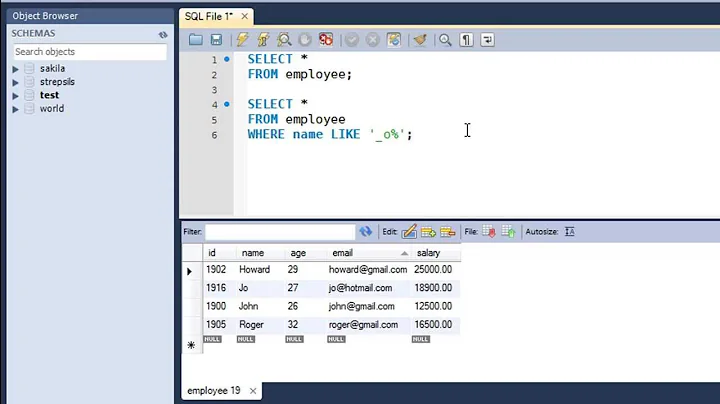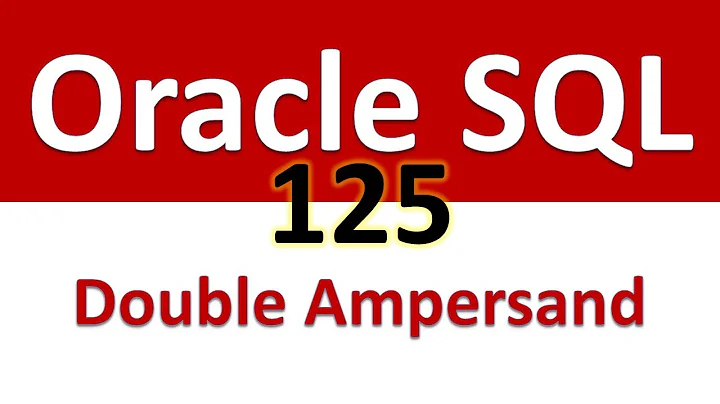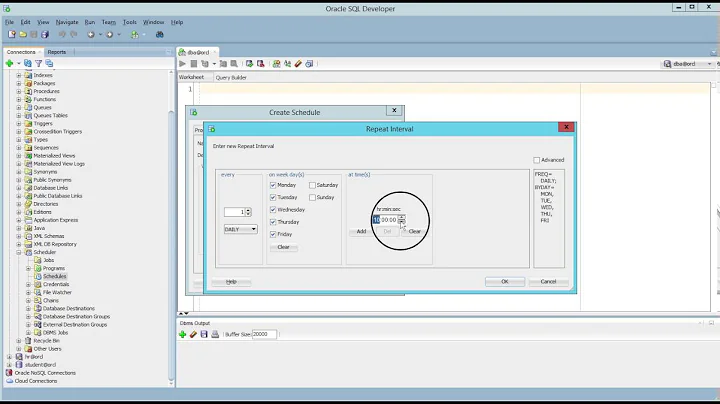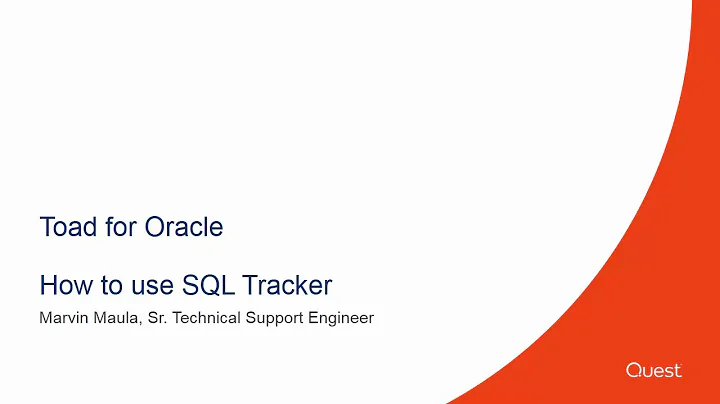How to handle/use special characters like percent (%) and ampersand (&) in Oracle SQL queries
15,013
Solution 1
If you want to match Field_Name values that contain 'bla%bla&2', then you need to write this:
set define off
Select * From Some_Table Where Field_Name Like '%bla\%bla&2%' escape '\';
You get to specify which character you want to use to escape a following character (thanks should go to mathguy, not me). You also have to set define off to prevent sqlplus from trying to substitute values in a string.
If, however, you want to match Field_Name values that exactly equal the given string, then you do this instead:
set define off
Select * From Some_Table Where Field_Name = 'bla%bla&2';
Solution 2
If I am not mistakend you escape them with a backslash (\)
Select * From Some_Table Where Field_Name Like 'bla\%bla&2' ESCAPE '\';
Solution 3
Use escape \ to treat is a literal
SELECT *
FROM Some_Table
WHERE Field_Name LIKE 'blah\%'|| 'blah' ||'&'|| '2';
Related videos on Youtube
Author by
W. Elbashier
Updated on September 15, 2022Comments
-
 W. Elbashier over 1 year
W. Elbashier over 1 yearI need to include the special character "%" in my LIKE clause in a SQL query, e.g.:
Select * From Some_Table Where Field_Name Like 'bla%bla&2';How do I write that?
-
mathguy over 6 yearsYou need to add
ESCAPE '\'after theLIKEcondition to let Oracle know what you are doing. It's not automatic. -
mathguy over 6 yearsYou need to add
ESCAPE '\'after theLIKEcondition to let Oracle know what you are doing. It's not automatic. -
mathguy over 6 yearsSorry, but no, that is not how you escape % in the LIKE condition. Best to delete this incorrect answer; someone already upvoted it, which means they think it is correct.
-
mathguy over 6 yearsSorry, but that means you don't know how to test, either. Try this:
select 1 as result from dual where 'yourstring' like 'your%%string';According to you, the result set should have zero rows, because the input string doesn't have an ampersand in it. But in fact it does return a row with the value 1 in theresultcolumn. -
mathguy over 6 yearsThis is correct and it will work, but the query is modified to work around an obstacle raised by the front-end program (like SQL*Plus). The better solution, as Bob Jarvis has shown in his answer, is to tell the front-end to behave nicely - by turning off that feature in the front-end itself. We can't torture our queries so that they will avoid all the oddities of all possible front-ends; when we write a query we should only have to worry about SQL, not about other things. With that said, "good job" since the answer is actually correct.
-
Juan over 6 yearsAdded @mathguy's comment. I thought that was only when you needed to set a different char.
-
mathguy over 6 yearsSQL*Plus treats anything of the form
&z[...]as a substitution variable - this is not limited only to digits. The solution is the right one though. -
mathguy over 6 yearsThis may work for ampersand (I didn't test and I don't know off the top of my head if it will), but I do know it will not work for percent. The percent sign will be concatenated and then still interpreted as a meta-character in the LIKE condition. Escape is the right way, it just has to be done... the right way!
-
 Ferdinand Gaspar over 6 yearsYou are right for the percent and it has to use \ for it while for ampersand pipes can be used.
Ferdinand Gaspar over 6 yearsYou are right for the percent and it has to use \ for it while for ampersand pipes can be used. -
Andrew over 6 yearsI've never used set define off. I'll have to add that one to my toolbox.
-
mathguy over 6 yearsThere is more to it. You can also set the marker for substitution variables to some other character (instead of &) - rather than turning that feature off. Each solution has its own uses/applications.
-
 W. Elbashier over 6 years@mathguy I posted the question and i voted for this answer. It worked. I'm using Oracle SQL Developer. The
W. Elbashier over 6 years@mathguy I posted the question and i voted for this answer. It worked. I'm using Oracle SQL Developer. Theset define offWhy do you think it's wrong? state your reason. Thanks. -
 W. Elbashier over 6 yearsThe
W. Elbashier over 6 yearsTheset define offdid help get around the "&", and theescape '\'skipped the "\". -
mathguy over 6 years@W.Elbashier - Under the Answer you will see a notation which is also a link, it says "Edited Aug 1 at 20:43". If you click on that link, you will see what was posted initially, then you will see how it was changed after I pointed out the original version wasn't going to work. As you can see in the edited answer, the responder specifically mentions that (which is the mark of a good responder - some people will make changes and pretend they didn't, as if we can't all see the history of changes through the Edited link).












